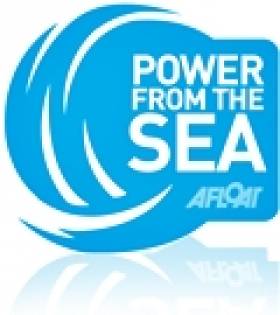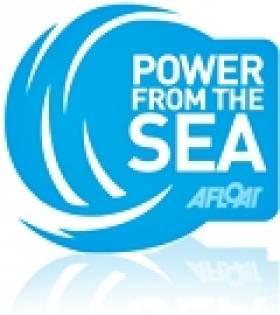Displaying items by tag: Aquamarine Power
#POWER FROM THE SEA - Martin McAdam of Aquamarine Power talks to The Irish Times about his company's efforts to harness power from the sea.
The Edinburgh-based firm has spent a number of years and some £60 million (€74.5 million) developing its sea surface instruments - using technology researched at Queen's University Belfast - at locations in Scotland, Northern Ireland and the United States.
Most recently, the business has been overseeing the final stages of an underwater base off Orkney to complete testing of its latest wave energy 'harvester' prototype, the Oyster 800.
As previously reported on Afloat.ie, the Oyster 800 can generate an incredible 800 kilowatts by way of a giant hinged flap that juts out of the water.
Each passing wave closes the flap shut like a clamshell, with the resultant hydraulic pressure driving an onshore turbine.
It marks an impressive development, but as McAdam says, the wave energy sector still requires patience from those who provide its funding.
“We need to perfect the technology that we have got," says the Aquamarine chief executive, who adds that the objective is “not revolution anymore, but evolution”.
“We shouldn’t be overambitious," he says. "We should get the technology to a stage where it is robust and cost effective. In 10 years’ time, if we in Scotland have somewhere up to 500MW, then that would be a successful industry.”
The Irish Times has more on the story HERE.
New Machines Changing the Rules for Wave Power
New Scientist has highlighted some of the latest technologies being developed to harness power from the sea.
Companies such as Pelamis Wave Power and Aquamarine Power are already testing prototypes of their so-called wave energy 'harvesters' - enormous machines that can capture the massive potential energy stored within ocean waves.
Pelamis' huge P2 is filled with state-of-the-art computers that allow programmers to control and update its operations on the fly, quickly taking advantage of changes in sea conditions to maximise energy production and increase efficiency.
The proof is in the pudding, as P2 can produce 750 kilowatts of power - twice as much as earlier prototypes.
Aquamarine's Oyster 800, meanwhile, can generate an incredible 800 kilowatts by way of a giant hinged flap that juts out of the water. Each passing wave closes the flap shut like a clamshell, with the resultant hydraulic pressure driving an onshore turbine.
"If you can get that sort of level of performance improvement then the economics suddenly start to look a lot more favourable," says The Carbon Trust's Stephen Wyatt.
New Scientist has more on the story HERE.






























































